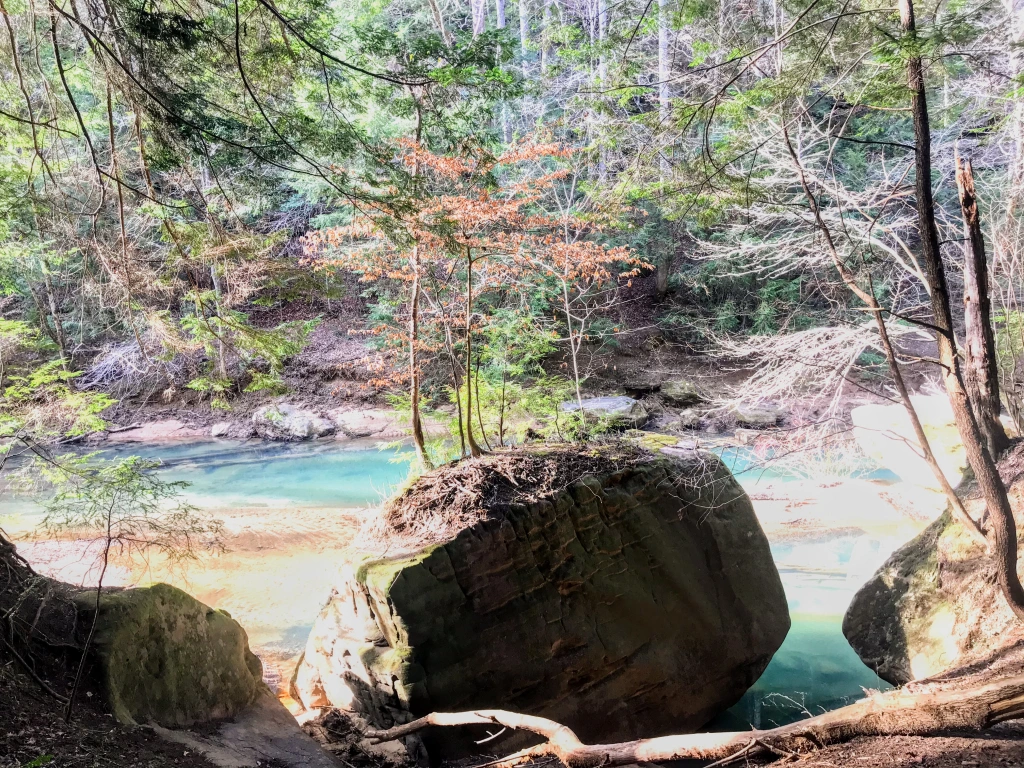A few weeks ago, I had a question about interpreting and applying 2 Corinthians 10:4,5. Several readers left comments that helped to drive my thinking in a certain direction or to offer their insight or just to encourage me: “That’s a good question.” (I’m easily pleased.) Some readers even thanked me for finally getting around to answering my question.
That’s when I realized I’m not the only one with a ton of questions that lack solid answers.
Well, I have another question.
As usual, this question is the result of what I’m reading. First, though I didn’t pursue an answer at the time, this question originally lodged itself in my mind several years ago when I participated in Beth Moore’s online study, Believing God. Second, I’m still pressing on with my Bible reading plan this year (Praise God!). I recently finished Joshua and started Judges. Third, I’m trying to read a book by Anne Graham Lotz. In it, she encourages the reader to go “deeper” and “take hold” of _______ (fill in your dream). Fourth, Priscilla Shirer has a new book out called, One in a Million, in which she teaches women how to live like Caleb and Joshua (the only 2 out of 2 million who entered the promised land). I’m not reading it, but I’ve watched the promo video. All of these things have forced me to ponder Israel’s possession of (or failure to possess) the promised land and what I, as one grafted in by the new covenant, am to learn from them and apply.
Paul is clear on this point: the history of Israel didn’t happen, nor was it recorded, for nothing.
Romans 15:4 “For whatever was written in former days was written for our instruction, that through endurance and through the encouragement of the Scriptures we might have hope.”
1 Corinthians 9:10 “Does he not speak entirely for our sake? It was written for our sake…”
1 Corinthians 10:6, 11 “Now these things took place as examples for us…Now these things happened to them as an example, but they were written down for our instruction, on whom the end of the ages has come.”
There’s instruction for me and I want to know what it is.
Last Friday when I met Lisa I asked: “What’s your response to this question: The Promised Land: here or Heaven?” We had a good discussion and we agreed that the “right” answer is Heaven. I, however, based my reasoning on observation and experience. I probably couldn’t articulate an answer based on Scripture alone. I want to be able to do that.
Well, that initial question has budded since Friday; I now have a hydra of questions creating more questions. I’ve learned that there is controversy surrounding this issue, so it’s possible that I won’t reach a definitive answer. But I hope that I can, at the very least, determine why I believe Heaven is the best answer.
The promised land: here or Heaven? What’s your initial response? If you know why you think so, please share. What books are out there that discuss this? Websites? Sermons? Podcasts? Leave a comment!




7 responses to “Questions. I am full of them.”
My “initial” response is heaven. But, with a little thought I think that the church is a little taste of God’s Kingdom to come and so in effect we can live out life as though in the promised land. (This could lead into a discussion of the millennium and whether Christ will return before or after, or if it’s a literal millennium at all!)
So maybe my answer is both – like our salvation has a now and not yet aspect to it – the Kingdom has come but not yet.
LikeLike
I would say the true Promised Land is Heaven.
However, I also feel that my current circumstances parallel the Israelites’ exodus from Egypt. We’re being delivered from bondage, and God is bringing us through a difficult situation (desert) to the land He wants to give us. I know it will be flowing with milk and honey and God’s blessings (not material, but spiritual…I do NOT ascribe to the “name it, claim it” theology.) I’m also not claiming that place where He wants us won’t have problems or trials. But it’s definitely where He wants us to go. So, in that sense, perhaps it’s a promised land but not THE Promised Land.
I’m probably rambling, and I have no Scripture to back it up. Good question 🙂
LikeLike
I think it depends on how you interpret Promised Land–which, duh, is the crux of our conversation. I too based my answer last week on a gut reaction with no real Scripture to support my interpretation. I will say that I have heard Promised Land kind of talk being more concerned with fulfilling one’s calling, or not, as the case may be. While your post has now served to awaken more questions for me as well (thanks), questions I haven’t properly researched yet, I will say I like what John Piper has to say here in regard to Heb. 4:1-3, tying in God’s promise of rest with the perseverance of the saints. It may not directly apply to your questions(s) but I like it nonetheless:
http://www.desiringgod.org/ResourceLibrary/Sermons/ByDate/1996/965_Be_Diligent_to_Enter_Gods_Rest/
LikeLike
Regarding “fulfilling one’s calling,” wouldn’t it be possible, then, to say that one missed that calling? That lack of faith caused at some point caused one to miss it? Like that generation of Israelites were not allowed into the Promised Land because of their lack of faith?
LikeLike
Also from John Piper:
How Does the Conquest of Canaan Point to the Future?
A final question to ask about Israel’s conquest of Canaan is how it may point to the future. Here we are not left to ourselves, because the writer to the Hebrews in the New Testament has already seen some very profound things. Without reading all of Hebrews 4, let me try to do for you what he does for his readers. First of all, he notices in Joshua 21:44 and 23:1 that “the Lord gave rest on every side, just as he had sworn to their fathers.” Rest—peaceful, satisfying freedom from assault—was part of the OT hope. And here it was at last. And yet, the writer to the Hebrews saw also that this rest was imperfect and short-lived. Enemies lurked in the land, and soon the people were led into idolatry. This is hardly the grand and final fulfillment of the promise to Abraham. Therefore, the mighty acts of God which brought Israel this far are a partial fulfillment of the promise, but at the very same time, point beyond this rest to another perfect rest which yet remains for God’s people. The conquest of Canaan becomes a type, a foreshadow, of something greater yet to come.
The writer to the Hebrews finds a confirmation of this hope in Psalm 95:7-11. He sees in verse 7 the plea, “O that today you would hearken to God’s voice!” Don’t be like the unbelieving generation who died in the wilderness, to whom the Lord swore that they would never enter his rest (Psalm 95:11). But catch what this implies. If the psalmist says, “Don’t be like those who were excluded from God’s rest,” but, “Today, hearken to his voice and harden not your heart,” then this implies that God’s rest, even after several hundred years, is still open and available to those who hear with faith. When the writer to the Hebrews sees this and adds to it that no experience of Israel from David’s time to the present could be equated with the promised rest of God, he concludes that, therefore, the rest, promised to Abraham and tasted after the conquest of Canaan, is still available to those who have the obedience of faith. Here is the way he says it in Hebrews 4:5-11:
And again in this place God said, “They shall never enter my rest.” Since therefore it remains for some to enter it, and those who formerly received the good news failed to enter because of disobedience, again he sets a certain day, “Today,” saying through David so long afterward, in the words already quoted, “Today, when you hear his voice, do not harden your hearts.” For if Joshua had given them rest, God would not speak later of another day. So then there remains a sabbath rest for the people of God . . . Let us therefore strive to enter that rest, that no one fall by the same sort of disobedience.
And now remember, “It is people of faith who are the sons of Abraham” (Galatians 3:7). “If you are Christ’s, then you are Abraham’s offspring, heirs according to the promise” (Galatians 3:29). So the promise is for you, “Come unto me, all ye who labor and are heavy-laden, and I will give you rest” (Matthew 11:28), a foretaste “today” in the peace that passes understanding, and then in the age to come perfect rest in a new heaven and a new earth, a promised land utterly free from enemies and from sin and from pain and fear and guilt and crying.
And of this we may be sure: if the old Joshua was victorious over the enemies of God, then how much more the new Joshua (Joshua and Jesus are the same name, you know). Everything about the conquest of Canaan was written for our sake, in order that we might have hope (Romans 15:4). In all those things we see reflected dimly the conquest of Jesus over Satan and sin and death and hell. With the blow that was struck at Calvary, we know the victory is ours. Therefore, “let us strive to enter that rest, that none of us fall by the same sort of disobedience.” For if we hold our first confidence firm to the end, the deep river of death will open before us, and Jesus will carry us over on dry ground to the land where all is peace.
LikeLike
My gut reaction is like yours – heaven. However, I don’t have any scripture to back that up.
On another note, I have done the One in a Million Bible study that you mentioned and it is great! It pretty much goes right with what Melissa was saying. Shirer gives a list of about 30 (scripture based) characteristics of a believer experiencing abundant life in Christ. She then says, “While we will not achieve perfection in these areas on earth, they can be our overarching experience. Promised land living here on earth is not a life with no problems. It means experiencing God’s power and presence in spite of difficulty. You know you are living in the land of abundance not when your circumstances change, but when (this list of characteristics) describes your life – even when circumstances have not changed.”
LikeLike
That sounds good, Elaine!
LikeLike